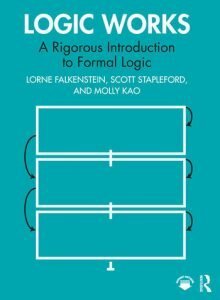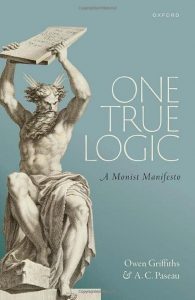Peter Smith's Blog, page 32
June 11, 2022
Logic Works?
 I can hardly complain about people adding unnecessarily to the over-supply of introductory logic books, having done it myself. But here’s yet another one, Logic Works: A Rigorous Introduction to Formal Logic by Lorne Falkenstein, Scott Stapleford and Molly Kao (published just six months ago by Routledge). I’ve been asked what I think of it. Having now taken a look at the book, I’ll save you the trouble of doing the same. It’s pretty bad. Not that I’ve struggled through all 645 pages. But you’ll forgive me that: life is short and patience limited.
I can hardly complain about people adding unnecessarily to the over-supply of introductory logic books, having done it myself. But here’s yet another one, Logic Works: A Rigorous Introduction to Formal Logic by Lorne Falkenstein, Scott Stapleford and Molly Kao (published just six months ago by Routledge). I’ve been asked what I think of it. Having now taken a look at the book, I’ll save you the trouble of doing the same. It’s pretty bad. Not that I’ve struggled through all 645 pages. But you’ll forgive me that: life is short and patience limited.
That’s a strange subtitle, no? As if introductions to formal logic aren’t usually rigorous. Or at least, as rigorous as they need to be — and as they say, “sufficient unto the day is the rigour thereof”. You might be tempted to worry, then, that a book that especially advertises itself as “rigorous” is likely to be unnecessarily laboured. You’d be right. And actually it is worse than that. It’s not just heavy-handed in explaining the technicalities, but quite generally the long-winded prose is depressingly clotted and terminally uninviting. I pity the poor students who have this inflicted on them!
Two sample episodes. Chapter 6 presents a Fitch-style deduction system for propositional logic. Good choice (though the system isn’t as streamlined as it could be). But the authors plod through a turgid presentation, without zip and zest, making very heavy going of things. It is really pretty difficult to imagine a reader coming to appreciate that by doing things Fitch-style we can arrive at a really rather elegant, natural, and highly user-friendly system. Things aren’t helped by the printed pages being a typographical mess.
The same applies in spades to the grimly laborious chapters introducing the language of predicate logic. Who would ever guess from these longueurs that the beautiful and compelling basic idea of a quantifier/variable notation for expressions of generality is so very neat and attractive once explained that it can be introduced well enough to convey a reading knowledge to any beginning mathematics student in half a lecture? (I was surprised to see that one of the authors does have some mathematical background — yet the writing throughout gives no sense of the aesthetic attractions of rigorous mathematical ideas.)
I could go into more detail, but I won’t. A rather depressing read, then, which I can’t recommend at all. If you want a good introduction to formal logic which also ranges quite widely, I’d stick to Nick Smith’s!
[Added And see Phil’s comment!]
The post Logic Works? appeared first on Logic Matters.
June 10, 2022
One True Logic
 There’s a new book out by Owen Griffiths and Alex Paseau, One True Logic: A Monist Manifesto (OUP). As the title suggests, this argues against logical pluralism. Yes, of course, there are myriad logical systems which we can concoct and study as interesting mathematical objects. But what about the logic we actually use in reasoning about them and about other mathematical matters? Is there in fact one correct logic which tracks what really does follow from what? Our authors take a conservative line, in that they are anti-pluralist: there is indeed one true logic for in-earnest applications. They are unconservative in defending a highly infinitary logic in that role.
There’s a new book out by Owen Griffiths and Alex Paseau, One True Logic: A Monist Manifesto (OUP). As the title suggests, this argues against logical pluralism. Yes, of course, there are myriad logical systems which we can concoct and study as interesting mathematical objects. But what about the logic we actually use in reasoning about them and about other mathematical matters? Is there in fact one correct logic which tracks what really does follow from what? Our authors take a conservative line, in that they are anti-pluralist: there is indeed one true logic for in-earnest applications. They are unconservative in defending a highly infinitary logic in that role.
I’ve read the first few chapters with enjoyment and enlightenment. But I’m going to have to shelve the book for the moment, as it will be too distracting from other commitments to engage seriously with the rest of it for a while. One of the delights of somewhat senior years is finding it more difficult to think about more than one thing at a time. (“But what’s new?” murmurs Mrs Logic Matters from the wings.)
For a start, I must continue cracking on with the category theory project. I have now revised Chapters 1 to 15 of Beginning Category Theory. So here they are, in one long PDF which also includes the remaining unrevised chapters from the 2015/2018 Gentle Intro.
In this iteration there are quite a few minor changes to Chapters 1 to 13 (correcting typos, clarifying some phrasing, deleting an unnecessary section, adding a new theorem in §12.2, etc.), though there is nothing very significant there. I have also now revised Chapter 15, the first of the two general chapters on limits/colimits. This and the preceding chapter on equalisers/co-equalisers could surely do with more polishing and lightening-up in places. But as I’ve said previously, I’m including revised chapters when they are at least an improvement on what went before (I’m not waiting for final-draft perfection!).
If you are like me, you are looking for the more-than-occasional consoling distractions from the state of the wider world. Let me share one.
Of the great pianists I have had the chance to hear live over the years, the one I perhaps find the most emotionally engaging of all is Maria João Pires. Her unmannered directedness goes straight to the heart. So here she is, playing Schubert, Debussy and Beethoven, in a video recorded in Gstaad last August.
The post One True Logic appeared first on Logic Matters.
June 4, 2022
Not Thinking Like a Liberal
 For over ten years, Raymond Geuss and I were both members of the Cambridge Philosophy Faculty. But apart from one year when, like two unbelieving bishops, we had to co-examine a metaphysics paper, I doubt we spoke more than a few hundred words. I suspect he thought I was simply an uninteresting unphilosophical philistine. In fact, we might have had just a little more in common than he suspected, apart from contrarian tendencies — stretching from being both brought up as Catholics to both being amused by the racier ancient Greek epigrams (indeed the first things I ever read by him were his versions in his Parrots, Poets, Philosophers and Good Advice).
For over ten years, Raymond Geuss and I were both members of the Cambridge Philosophy Faculty. But apart from one year when, like two unbelieving bishops, we had to co-examine a metaphysics paper, I doubt we spoke more than a few hundred words. I suspect he thought I was simply an uninteresting unphilosophical philistine. In fact, we might have had just a little more in common than he suspected, apart from contrarian tendencies — stretching from being both brought up as Catholics to both being amused by the racier ancient Greek epigrams (indeed the first things I ever read by him were his versions in his Parrots, Poets, Philosophers and Good Advice).
I have now just been reading Geuss’s new short book Not Thinking Like a Liberal (Harvard UP) with great enjoyment and some enlightenment too. He recounts his strange out-of-its-time education, at a Catholic boarding school in the USA, largely staffed by Piarist priests, many Hungarian emigrés. This taught not a narrow authoritarian Catholicism, but a wide-ranging European culture transplanted to Pennsylvania. And Geuss finds — especially in the remembered teaching of one Fr. Krigler — the roots of his own distancing from the shallow “liberalism” of the kind he discerns in much political thinking. The earlier parts of the book are indeed fascinating and insightful.
Later pages found me a bit less carried along. Geuss does no better than others, for example, in conveying what was supposed to be so impressive about his teacher Sydney Morgenbesser at Columbia (Morgenbesser sounds pretty irritating to me). And the concluding pages about unclarity are rather too arm-waving, and the pages about negativity rather too negative, for my liking. But I still very warmly recommend this book as perhaps the most engaging of his writings (apart from those epigrammatic poems, that is!).
The post Not Thinking Like a Liberal appeared first on Logic Matters.
June 3, 2022
Beginning Category Theory: Chs 1 to 14 (etc.)
Back from Cornwall, and I have now revised Chapters 1 to 14 of Beginning Category Theory. So here they are.
As before, to keep things simple, there is one long PDF with both the reworked chapters and the remaining unrevised chapters from the 2015/2018 Gentle Intro. I have added a little to Ch. 2, and tidied up Ch. 12. But the main revision this time is a much improved version of Chapter 14 on equalizers and co-equalizers. I’m still not entirely happy with it, but it is a heck of a lot better than it was. Enjoy!
Famous last words, but looking ahead, I think the next few chapters will be an easier job to revise, so I hope to now pick up speed again.
In case you hadn’t noticed, you can now again sign up to get e-mail notifications when there are updates here (see the bottom left footer on larger screens, or subscribe here on a mobile).
The post Beginning Category Theory: Chs 1 to 14 (etc.) appeared first on Logic Matters.
May 31, 2022
hughmellor.com

It is a delight to see that, with thanks to Tim Crane, there is now a new website in memory of Hugh Mellor, who died almost two years ago on June 21, 2020. The site collects Hugh’s philosophical work, downloadable papers, memoirs and obituaries (and some photos, including this one by Mrs Logic Matters).
I do miss Hugh a good deal, so I’m much looking forward to looking round the site. I’ll let you know about particularly interesting things I find in the unpublished lectures and talks etc.
The post hughmellor.com appeared first on Logic Matters.
May 25, 2022
Postcard from Cornwall

The first time back in St. Mawes since the beginning of the pandemic. A magical place. It has been wonderful to look out over the harbour even on wetter, greyer days: a delight from early morning to the very end of the day. And we have walked and walked hereabouts. Cobwebs blown away. For a couple of weeks, the dire mess of the wider world seems particularly far away.
Soon, it‘s back to Cambridge, to category theory (I’m promising a much better chapter on equalizers/co-equalizers), some musings on a philosophical view from Terence Tao, some potshots at a recent dreadful intro book on formal logic. But just for now, logic can look after itself. The sun is going down over Roseland. Calm sea. Peace.
The post Postcard from Cornwall appeared first on Logic Matters.
May 13, 2022
New Brahms album from the PHQ
The Pavel Haas Quartet’s recent performances of the Brahms quintets with their friends Boris Giltburg and Pavel Nikl (I’ve caught some online) have been just stunning. And now there is a new album released today. Extraordinary.
The post New Brahms album from the PHQ appeared first on Logic Matters.
May 11, 2022
That nothing is certaine
I’ve been trying to put together better notes on elementary category theory; which is an engaging exercise, but that doesn’t lead to anything very interesting to report here. Another thing occupying me on and off has been writing quite extensive comments on a draft book by an ex-colleague: but although that does raise very interesting issues, it mostly wouldn’t be appropriate to rehearse them here.
Then there have been time-consuming domestic chores — including tackling the Book Problem once again. This time round, it’s been the non-work books. Piles around the house acquired over lockdown (and I’m not the only guilty party) were beginning to totter. So it’s been the occasion for an overdue major sort-out, with re-shelvings, donations of bags to Oxfam, and all those discussions “are either of us ever going to read that/read that again?”. Yes, I would for example, have liked to have read the massive biography of Darwin: but life is too short (a phrase that becomes ever more telling as the birthdays clock by). That’s a precious three inches of shelf-space reclaimed. And so on it goes … But hardly the topic for a riveting essay here!
But perhaps the main reason for the lack of many posts recently has been low spirits as much as anything: try as you might, the state of the world just gets you down, no? The grim uncertainty of it all. But then,
… these things every one doe enwrap and entangle silly mortall men, void of all forecast and true understanding: so as this only point among the rest remains sure and certain, namely: That nothing is certaine …
Thus Pliny, “done into English” by Philemon Holland.
The post That nothing is certaine appeared first on Logic Matters.
May 2, 2022
Philosophical Uses of Categoricity Arguments
Peter F. has written:
I wanted to let you know about a paper that was recently put on the arXiv which I think you and many readers of this site will find very interesting, in case it hasn’t been noticed yet:
Penelope Maddy & Jouko Väänänen “Philosophical Uses of Categoricity Arguments” https://arxiv.org/abs/2204.13754
This does indeed on a quick skim look a seriously interesting and thought-provoking paper. Thanks for the pointer!
The post Philosophical Uses of Categoricity Arguments appeared first on Logic Matters.
April 27, 2022
Beginning Category Theory: Chs 1 to 13 (etc.)
I have now re-revised Chapters 1 to 13 of Beginning Category Theory. So here they are again, as before together in one long PDF with the remaining unrevised chapters from the 2015/2018 Gentle Intro. [You may need to force a reload to get the latest version, dated April 27.]
There are significant changes in the rhetoric of Chapter 3, though the intended general position hasn’t really changed. Elsewhere there are scattered, mostly minor, changes to improve clarity and readability. I’m still far from happy with the overall tone/style: but I hope I’m edging slowly, slowly in the right direction!
OK, the next major task is to tidy up the chapter on equalizers and co-equalizers. Now, I motivated the categorial treatment of products at some length by talking more informally, and pre-categorially, about what we want from pairing schemes. But at the moment, like almost every elementary presentation, I just plonk the definitions of equalizers and co-equalizers on the table without motivational pre-amble, and then pull the rabbit out of the hat and say “oh look, quotients of equivalence relations are a special case of co-equalizers!”.
That’s not at all satisfying, and I’d like to do better!
The post Beginning Category Theory: Chs 1 to 13 (etc.) appeared first on Logic Matters.



